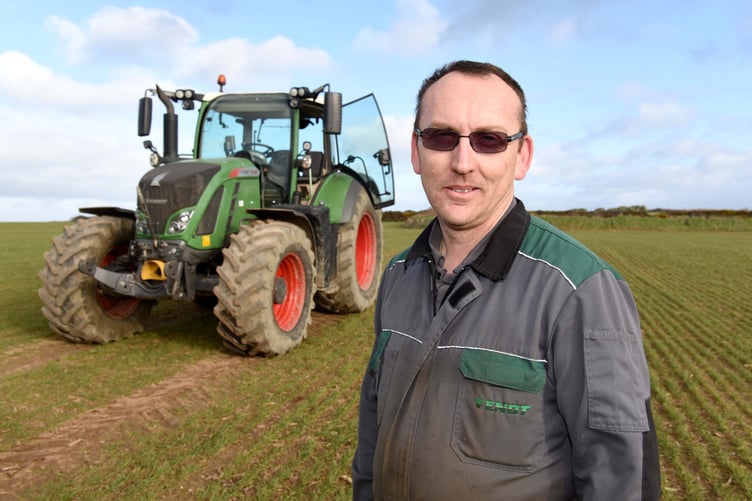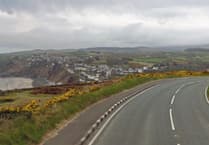The Government just pays lip service to having food security: their idea of food security was purchasing Steam Packet,’ says David Brew.
And, whilst there is nothing wrong with making sure that the island has access to the imports it needs, David is concerned about losing the more basic element of food security, that of using the vital foodstuffs we can produce here ourselves, such as milling wheat.
In recent years, Ramsey Bakery has been the major customer of Laxey Glen Mills, purchasing around 90% of the flour it produces. The mill, which has been in government ownership since 1974 uses only locally grown milling wheat which around 10 farmers are contracted to grow. Between the bakery and the mill, the amount of milling wheat that would be required each year was decided and the farmers would plant their crops accordingly.
It was an arrangement that not only worked for those concerned but also ensured that the island would never be without fresh loaves of bread, not even during Covid, or when the boat couldn’t sail because of bad weather.
But the closure of Ramsey Bakery, in April, has left the farmers in a kind of limbo. They already had crops in the ground and suddenly those crops are no longer required. Nor are any more likely to be required next year.
David, who farms in the north of the island and has been growing around a quarter of the mill’s total annual wheat intake, recently posted a video of himself in the cab of his tractor, in the middle of combining what he said would probably be his last field of milling wheat.
He told the Examiner: ‘The situation is that we are contracted to grow milling wheat for Laxey Glen Mills but they have indicated to all the contractors growing for them that they can’t purchase any of the wheat.
‘There are ongoing talks between the Manx NFU and DEFA but at the moment I don’t think a conclusion has been reached.’
It is understood that the mill has already got in stock two years’ supply of wheat at their present rate of consumption so they are unlikely to need any more in the foreseeable future.
In these circumstances, and when there is a world shortage of wheat, it would seem obvious that growers here could export their wheat and take advantage of higher prices across.
However they face a number of challenges, the most significant of which are the cost of importing seed and fertiliser – input costs – and the cost of transporting the goods off the island.
But David says: ‘At the moment everything that’s produced on the island and not consumed on the island is uneconomic because of the scale of production and the costs of export. Taking into account the cost of producing it and the cost of sending it across would mean they were producing at a loss.’
There is also the possibility of storing the wheat on farms in the hope that demand, and prices, would rise even more. However, once this year’s harvest is over in a few weeks’ time, farmers will then need to be thinking about what to put into the ground for next year. And they will need the income from their current crop to finance it.
David says: ‘At the moment everybody is just scratching their heads and saying: “What do we do with the land?”’
The largest grower for the Mill is Will Mcmillin who currently has around 400 acres down to milling wheat. A few months ago he turned the fields along the Sulby straight a wonderful shade of blue, growing linseeds under contract for a UK company, so he has clearly found a way to make exporting his crops work.
However, as he explains, the economic viability of doing this largely depends on the value of the crop. Because export charges are calculated on the weight of the load, a 20-tonne load of a lower value crop would cost the same as a 20-tonne load of a higher value crop, so it only makes economic sense to export a crop that is of higher value. The crops Will has grown for export, including the linseeds, oil seed rape and micronized peas, would fall into this category, but not wheat.
When it comes to what he will put in the ground this autumn, Will says: ‘It’s a bit open. I haven’t 100% decided what I’m going to do. It’s going to have to be something for export. I can’t grow barley for the local cattle finishing market because there are no big cattle finishers left to use up any big volume.
‘The mill has been using 2,000 - 2,500 tonnes of milling wheat over the last two years and if we grew 2,000 tonnes of barley instead there would be no market for it.’
And, with a decision needing to be made soon, Will is frustrated that there seems to be no urgency to find a solution.
‘It’s a big problem at the moment, trying to find a market for something that we can grow and the powers that be don’t seem to understand the time element,’ he says.
And it’s not just farmers moaning at a time when everybody is feeling the pinch, nor is it even just about losing one the island’s valuable food resources.
David says: ‘It knocks on to the hauliers, Laxey Glen Mills, local merchants and others. Instead of the money staying circulating on the island in the economy there will be jobs lost. It’s a downward spiral. And we’re still in the summer: wait until we hit the middle of winter, then we’ll see the problems.’
In March and April there were record price spikes on wheat and maize in the commodity markets and David says: ‘Price increases are only just starting to filter through: your 60 to 70p loaves will be a thing of the past.’
Will agrees, saying: ‘I don’t think people understand the gravity of the situation.’
We approached the Manx NFU and Laxey Glen Mills about the current situation but, with talks continuing to find a solution, neither was able to comment.


.jpeg?width=209&height=140&crop=209:145,smart&quality=75)


Comments
This article has no comments yet. Be the first to leave a comment.